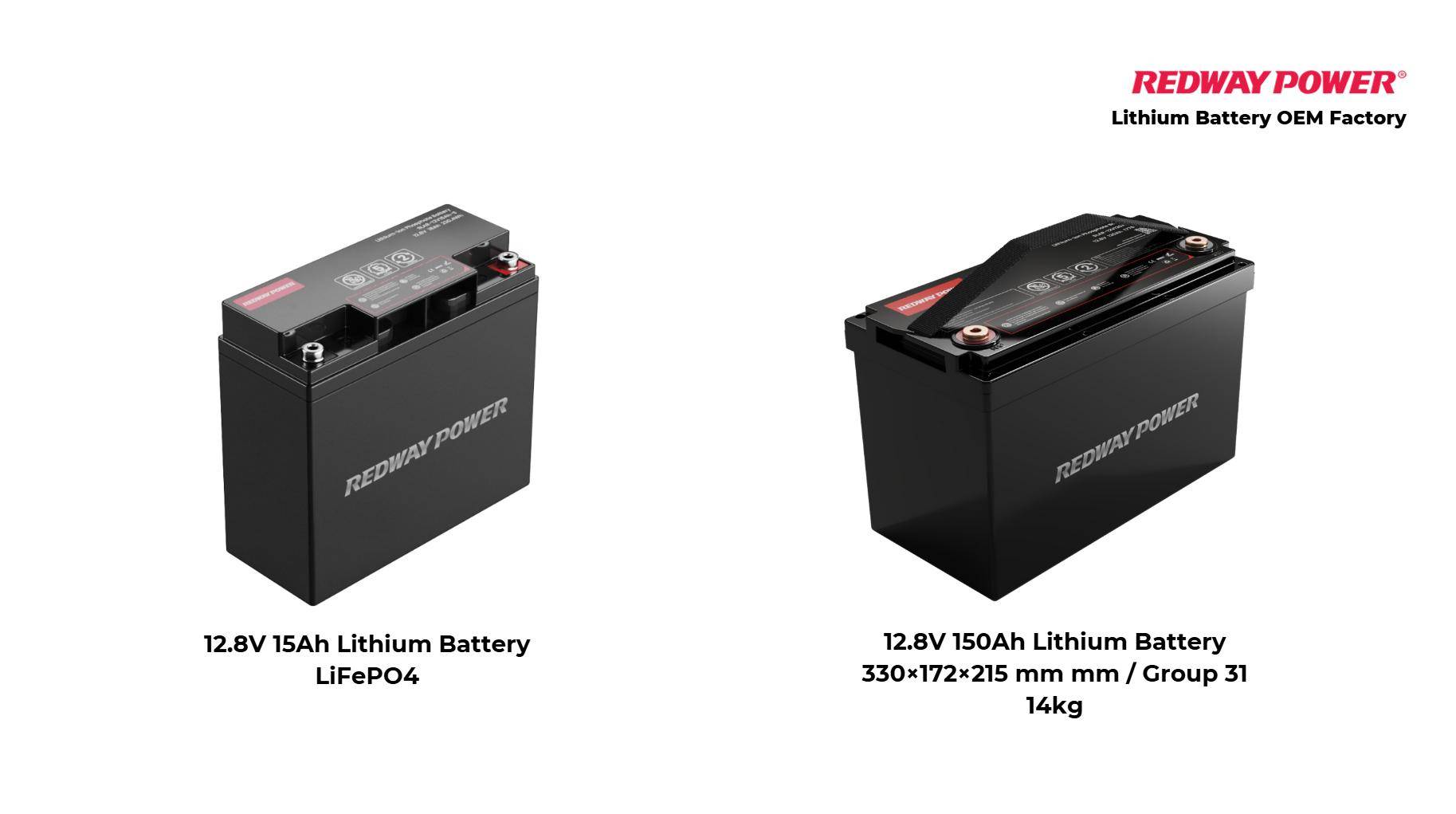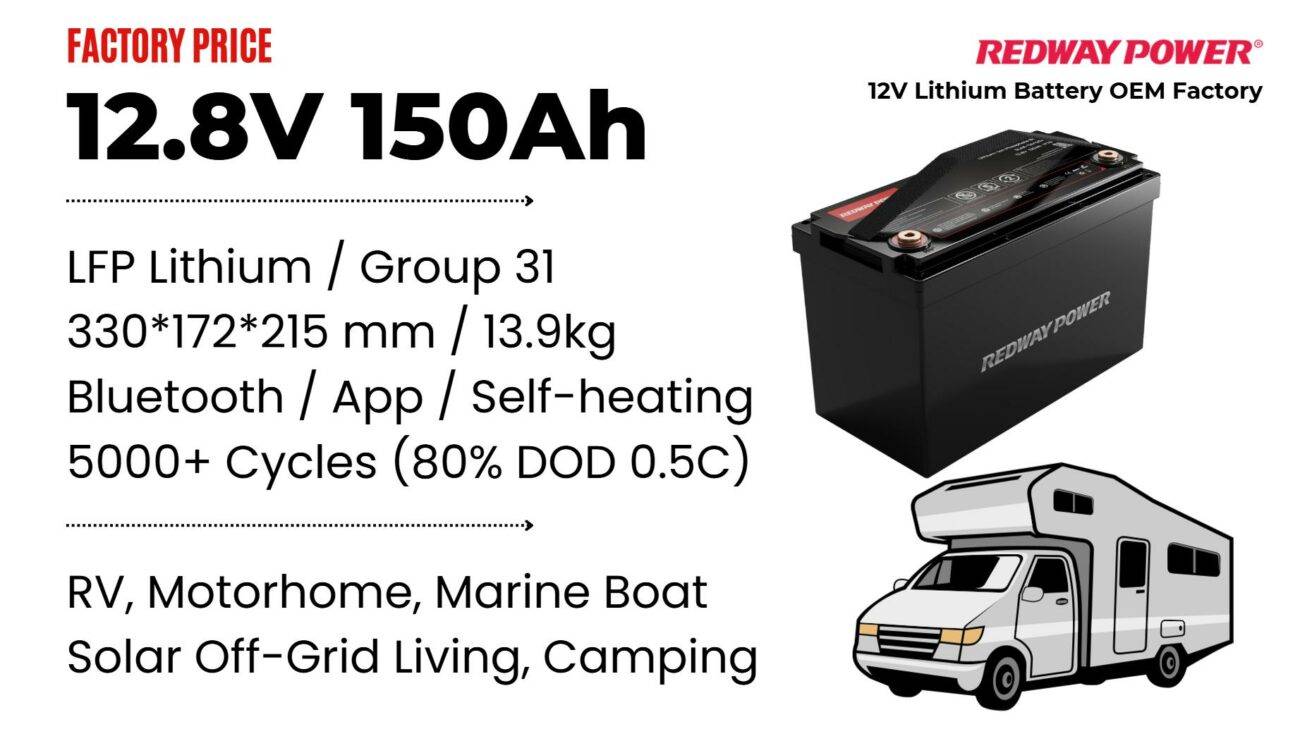- Forklift Lithium Battery
-
48V
- 48V 210Ah
- 48V 300Ah
- 48V 420Ah (949 x 349 x 569 mm)
- 48V 420Ah (950 x 421 x 450 mm)
- 48V 456Ah
- 48V 460Ah (830 x 630 x 590 mm)
- 48V 460Ah (950 x 421 x 450 mm)
- 48V 460Ah (800 x 630 x 600 mm)
- 48V 460Ah (820 x 660 x 470 mm)
- 48V 500Ah
- 48V 560Ah (810 x 630 x 600 mm)
- 48V 560Ah (950 x 592 x 450 mm)
- 48V 600Ah
- 48V 630Ah
-
48V
- Lithium Golf Cart Battery
- 12V Lithium Battery
12V 150Ah Lithium RV Battery
Bluetooth App | BCI Group 31
LiFePO4 Lithium
Discharge Temperature -20°C ~ 65°C
Fast Charger 14.6V 50A
Solar MPPT Charging - 24V Lithium Battery
- 36V Lithium Battery
- 48V Lithium Battery
-
48V LiFePO4 Battery
- 48V 50Ah
- 48V 50Ah (for Golf Carts)
- 48V 60Ah (8D)
- 48V 100Ah (8D)
- 48V 100Ah
- 48V 100Ah (Discharge 100A for Golf Carts)
- 48V 100Ah (Discharge 150A for Golf Carts)
- 48V 100Ah (Discharge 200A for Golf Carts)
- 48V 150Ah (for Golf Carts)
- 48V 160Ah (Discharge 100A for Golf Carts)
- 48V 160Ah (Discharge 160A for Golf Carts)
-
48V LiFePO4 Battery
- 60V Lithium Battery
-
60V LiFePO4 Battery
- 60V 20Ah
- 60V 30Ah
- 60V 50Ah
- 60V 50Ah (Small Size / Side Terminal)
- 60V 100Ah (for Electric Motocycle, Electric Scooter, LSV, AGV)
- 60V 100Ah (for Forklift, AGV, Electric Scooter, Sweeper)
- 60V 150Ah (E-Motocycle / E-Scooter / E-Tricycle / Tour LSV)
- 60V 200Ah (for Forklift, AGV, Electric Scooter, Sweeper)
-
60V LiFePO4 Battery
- 72V~96V Lithium Battery
- Rack-mounted Lithium Battery
- E-Bike Battery
- All-in-One Home-ESS
- Wall-mount Battery ESS
-
Home-ESS Lithium Battery PowerWall
- 24V 100Ah 2.4kWh PW24100-S PowerWall
- 48V 50Ah 2.4kWh PW4850-S PowerWall
- 48V 50Ah 2.56kWh PW5150-S PowerWall
- 48V 100Ah 5.12kWh PW51100-F PowerWall (IP65)
- 48V 100Ah 5.12kWh PW51100-S PowerWall
- 48V 100Ah 5.12kWh PW51100-H PowerWall
- 48V 200Ah 10kWh PW51200-H PowerWall
- 48V 300Ah 15kWh PW51300-H PowerWall
PowerWall 51.2V 100Ah LiFePO4 Lithium Battery
Highly popular in Asia and Eastern Europe.
CE Certification | Home-ESS -
Home-ESS Lithium Battery PowerWall
- Portable Power Stations
How Long Does It Take to Charge a Fully Depleted 12V Lithium Battery?

Charging a fully depleted 12V lithium battery is influenced by multiple factors, including the battery’s capacity, the type of charger, and the chosen charging method. Understanding these variables can help you optimize your charging process and prolong the life of your battery.
Charging Time Based on Capacity and Charger Output
When discussing charging times, it’s essential to differentiate between the various charging rates:
- Fast Charging: Utilizing a charger rated at 1C can yield impressive results. For example, a 100Ah battery charged at 100A can achieve a full charge in about 1 hour. However, this method is generally not recommended for regular use, as it can place significant stress on the battery, potentially reducing its lifespan.
- Standard Charging: A more sustainable approach involves charging at rates between 0.5C to 0.3C. In this scenario, a 100Ah battery charged with a 50A charger would take approximately 2 to 3 hours to reach full capacity. This method effectively balances efficiency with the health of the battery, promoting longevity.
- Lower Charging Rates: For those opting for smaller chargers, such as a 10A charger, the charging time for a fully depleted 100Ah battery can extend to around 10 hours. This slower charging method can be beneficial for maintaining battery health over time.
Example Charging Times
To illustrate further, consider the following examples based on varying capacities and charger outputs:
- 12V 100Ah Battery:
- Using a 10A charger: Approximately 10 hours.
- Using a 20A charger: Approximately 5 hours.
- Using a 50A charger: Approximately 2 hours.
- 12V 200Ah Battery:
- Using a 20A charger: Approximately 10 hours.
- Using a 40A charger: Approximately 5 hours.
These examples highlight how the choice of charger significantly impacts charging duration.
Factors Influencing Charging Time
While capacity and charger output are primary considerations, several additional factors can influence charging times:
- Battery Management System (BMS): Most lithium batteries are equipped with a BMS that optimizes charging and protects against overcharging. A sophisticated BMS can help maintain the battery’s health and safety during the charging process.
- Temperature Conditions: Lithium batteries perform best within a specific temperature range. Charging a battery in extreme cold or heat can affect its charging efficiency. Ideally, a temperature between 32°F (0°C) and 113°F (45°C) is recommended for optimal performance.
- State of Charge (SoC): The current charge level of the battery before charging begins also plays a role. A battery that is partially depleted will take less time to reach a full charge than one that is completely empty.
Best Practices for Charging 12V Lithium Batteries
To maximize the lifespan and performance of your 12V lithium battery, consider implementing these best practices:
- Use a Quality Charger: Invest in a high-quality charger designed specifically for lithium batteries. This ensures compatibility and optimal charging efficiency.
- Charge at Moderate Rates: Opt for charging rates that balance speed and battery health, typically between 0.5C and 0.3C. This method minimizes wear on the battery and extends its overall life.
- Monitor Temperature: Regularly check the battery’s temperature during charging. If it becomes too hot, consider reducing the charging rate or allowing it to cool before continuing.
- Avoid Deep Discharges: Regularly depleting your battery to very low levels can shorten its lifespan. Aim to keep the charge between 20% and 80% for optimal health.
Conclusion
In summary, charging a fully depleted 12V lithium battery can take anywhere from 1 to 10 hours, depending on the charger used and the battery’s capacity. By understanding the factors at play and adopting best practices, users can effectively manage their charging processes, ensuring longevity and reliability in their battery systems. For those in need of custom LiFePO4 battery solutions, Redway Power stands ready to provide top-notch products tailored to your specific requirements.
















